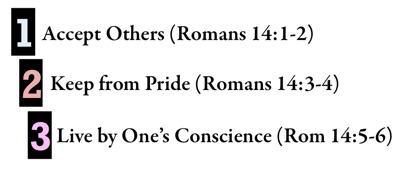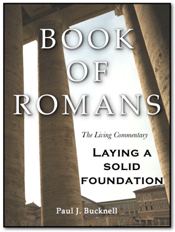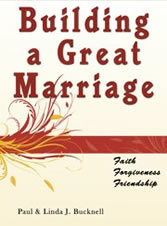
Romans: Laying a Solid Foundation
The Bible Teacher's Commentary
Paul J. Bucknell
on Romans 14:3-4
Paul J. Bucknell
Keep From Pride
Romans 14:1-23 Intro | Romans 14:1-6 Conflict | Romans 14:1-2 Accept Others
Discerning Moral and Amoral Issues
Romans 14:3-4 Pride | Romans 14:5-6 Conscience
Romans 14: 7-12 Accountability | Romans 14:13-23 Love
Video Podcast | Bible Study Questions | Romans 14:1-23 Handout
Purpose of Romans 14:3-4
Romans 14:3-4 Keep from Pride takes a special corner in dealing with this issue of toleration. If we really understood the danger of judging a brother, we probably would not judge another. Satan sneaks into our minds and destroys our relationship with God and others through insidious pride. The is part of The Bible Teacher's Commentary on the Book of Romans. Previous | Next

Keep from Pride (Romans 14:3-4)
3 Let not him who eats regard with contempt him who does not eat, and let not him who does not eat judge him who eats, for God has accepted him. 4 Who are you to judge the servant of another? To his own master he stands or falls; and stand he will, for the Lord is able to make him stand.
Paul spends a lot of time discussing attitudes. After all, it is not what they were doing regarding the days and food that really mattered. The problem was with their attitudes toward each other. This is much easier said than done.
Put Away pride
First, each person should put away one’s pride. Paul does not use the word ‘pride’ here in verses 3-4 but the phrases, ‘Let not regard with contempt’ or ‘Who are you to judge...’ both carry this meaning. The ‘weak’ tend to look down on those who in their eyes are insensitive to God’s Word. The ‘strong’ can easily despise those with a weaker faith, those who do not eat (meat).
In both cases, they have pride. They are judging another as if they are responsible to judge them. This would be a grave mistake. Paul says that God is the judge. “To his own master he stands or falls; and stand he will, for the Lord is able to make him stand.”
God has accepted both groups. Neither group has the right to disdain or judge another.
Focus on One’s Own Faith
Second, we should positively focus on our own faith before the Lord. We are not responsible to judge others but to consistently and faithfully live out our faith before the Lord.
There are many such issues in today’s church including ordination of women, modest dress, the Lord’s Day, foods, and all the cultural clashes (we understand this short list includes issues that are considered wrong by some. We are not trying to minimize its importance by being in this list). Instead of being prideful and regard others with contempt, we need to double check whether we are rightly living before the Lord.
When we think of others, we need to accept their level of faith and help them grow in that faith.
This difference of lifestyle should not create conflict with each other but instead serve as an opportunity to again prove our love. These tests will continue on through our lives.
One example of this might be a church which respects the believers who do not eat pork (maybe from Muslim background). They therefore avoid using pork for a church luncheon. Another church perhaps joyfully prepare vegetarian meals (for those from Hindu or New Age background).
Individual believers should go out of their way to regulate their standards for those ‘weak’ in faith. But having said this, the ‘weak’ in faith should not assume everyone understands their convictions nor should they judge those who perhaps would eat pork right next to them. It is important that the church as a whole is dictated by the consciences of all the weak.
Moderation and wisdom is needed. Everyone is accountable to the Lord. Therefore we can focus on serving and loving each other. More specific treatment on this oft misunderstood phrase, “Judge not others” is below.
Issue: “Judge not Others”
The phrase ‘judge not others’ is often misunderstood. We want to develop a good foundation through which we can properly understand what Paul means by that phrase which is so often taken out of context to legitimize what is wrong.
There is a great need to rightly discern the scriptures and for each believer not to adopt the phony, “Don’t judge me” defense mechanism for living in open disobedience to God’s Word. Some believers have never really engaged in seriously discerning the biblical standards for the issues concerned. We admit some are not very easy to understand, but that does not mean that we ignore our responsibility. Our ability to mature in discernment has much to do with our spiritual maturity (see discussion above on Hebrews 5:14).
Where we fall short of some standard, then as Paul commands, we need to repent for living unholy lives. Don’t defend your evil behavior. Paul’s instructions on being graciousness toward the ‘weak’ is for those in a totally different situation. Their behavior is not evil but only considered evil by some.
Although Paul says these things, we must keep these issues in context. Some believers have put aside commands as being from the Old Testament or that judgment of another is always wrong. The church will quickly loose its power if it goes to these extremes. (Look under verses 1-2 for extended treatment on this).
The misunderstanding over judging one another is understandable. Paul does call the church not to judge one another. But the context here is of one prideful group looking down upon another. Judge in this sense means to criticize to a point of judgment. When groups begin to judge each other, the church has great difficulty in rightly focusing on serving.
This spirit of judgment is noticeable when one feels more right than the other and that the others are lesser believers or at least deserve lesser treatment from the Lord. Often the believer is critical of another, only acknowledging of one’s wrong rather than one’s right choices.
Paul clearly states that one believer should not usurp God’s position of Judge. God is the judge. God will judge others. When we set ourselves as the judge, then we take God’s role as Judge.
As much as Paul speaks here about ‘no one judging another’, we should not conclude that there are no commands or standards. Love consists in living by standards (Romans 12). Note the implications of standards on certain theological perspectives which are not in contradiction to what Paul says in Romans 14.
-
God does set standards (laws, commands (See Romans 12-13).)
-
God expects us to live by His standards
-
God will judge us for not living by His standards (i.e. curse)
-
God will reward us when we live by His standards (i.e. blessings)
What about correction in church discipline?
Others will use the teaching ‘not to judge’ out of context and infer that there should not be any correction or what we know of as church discipline. This is not the case.
Although discussion of this issue goes beyond our purpose here, let me briefly point out a verse that sets the proper way the church should address open problems seen in the lives of believers within the church. This will help support our interpretation that the meaning ‘judge not others’ is not meant to exclude confrontation or rebuke. Confrontation is done in love which is in clear contrast to the judging spirit where one does things from pride.
The church is called to love and bring people into restoration to the Lord (Gal 6:1).
“Brethren, even if a man is caught in any trespass, you who are spiritual, restore such a one in a spirit of gentleness; each one looking to yourself, lest you too be tempted” (Galatians 6:1).
The word trespass speaks of doing something that is clearly wrong (immoral). Notice the same caution regarding pride is given here as it is in Romans 14. There is a place for correction but it should be done from love (note the word ‘restore’).
There is a whole different spirit here than that which is behind those groups in Romans 14. In Romans 14 we have a spirit of pride which wants to affirm our correctness even though others might be hurt or felt left out. In this case, a believer in love seeks to lead others back to the Lord.
Application
-
Do you tend to look down on other believers? Why?
-
Do you think that you are better than others?
-
What areas do you tend to be most prideful?
Continue on to Romans 14:5-6 - Live by One’s Conscience
BFF -> Moving our generation's heart and mind closer to the Lord through the powerful truth of God!








